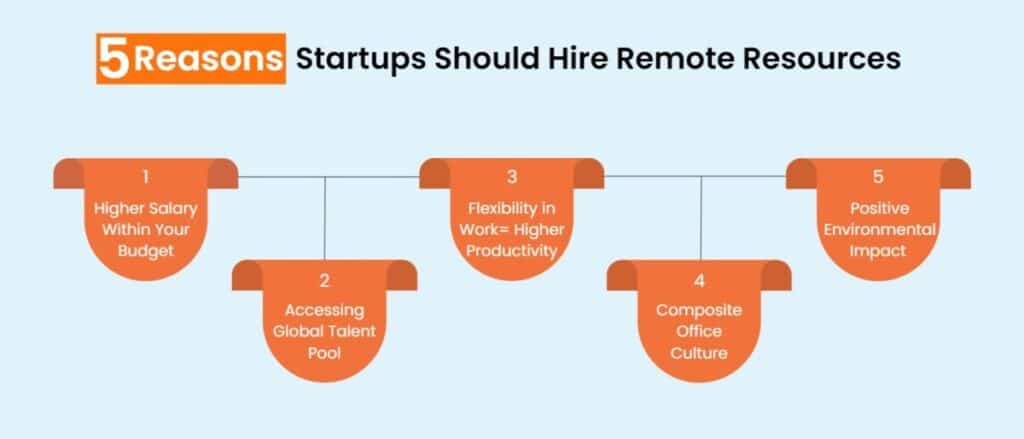The United States of America alone is home to 33.2 million startups and small to medium sized businesses, as of 2022. Among them, one-fifth of the fastest-growing ones are headquartered in San Francisco. With statistics like this, these businesses harbor the potential to attract top global talent. That is why it only makes sense for them to hire more remote employees.
According to the same study by the US Small Business Administration, about 27 million of these businesses have no workforce outside the owner; 5.4 million employ up to 20 people, and 650,000 have up to 500 workers. This information, combined with the skilled labour shortage plaguing the West, indicates the growing need to hire remote resources from the global talent pool.
Let us take a look at the top 5 reasons why startups should hire remote employees, and how some are already successfully working with virtual teams to augment their business:
- Higher Salary within Your Budget
It is no secret that newly found startups, however well financed they might be, should investigate all options of saving as much overhead costs as is possible. Let alone the fear of the growing business failing in the foreseeable future, cutting down on costs right from the beginning should be a top priority if you have a newly launched startup. And one way to ensure that is by demarcating a dedicated budget for employee salaries.
It does not come as a surprise that top professionals do not want to join startups, that is, unless they are offered a handsome salary. However, startups usually do not have the budget for that, while they are the ones standing to benefit the most from these industry seasoned experts. Hiring remote talent can serve the purpose as the budget of infrastructure can be allocated to the salaries, and employees can save on transportation, accommodation, etc., to retain a larger sum of their paycheck.
- Accessing Global Pool of Talent
According to a statistic by Bloomberg, it is reported that about 50% of small and medium-sized businesses in the United States of America alone were unable to fill vacancies in their organizations in June 2022. That is supported by studies that figure out the number of new, growing and small businesses failing within the first 5 years. Based on a survey by the Commerce Institute, four out of five make it through the first year alone.
These statistics do make employees wary of associating with new small businesses, but as discussed earlier, a competitive compensation package stands to alleviate those fears. There is a slim chance that you will find exactly the employee you are looking for within your local reach, within your budget. Having access to a global talent pool would help you attract talent within your budget and get you the right kind of skillset suited for your job.
- Flexibility in Work = Higher Productivity
One of the hidden benefits of remote work has actually turned out to be an increase in productivity and work output of employees, rather than a decrease, as was the predicted anxiety. This has been possible because of the flexibility that remote working stands to offer. Without hassles of commuting, long hours wasted in miscellaneous office work, etc., employees have the freedom to be more productive throughout the day.
Working from the comfort of a home setup with zero distractions, and the freedom to take breaks when they need, employees are less likely to feel the stress of working. And with the evolution of high-tech user-friendly project management tools and software today, remote workers are in a position to choose working from anywhere. This certainly aids communication and connection while minimizing the effects of creeping work monotony.

- Composite Office Culture
Creating a composite office culture right from the start of the business is a task in itself. It becomes especially cumbersome if teammates are remotely located. In such a scenario, however, it is even more necessary as employees, being globally hired, are supposed to be from a heterogeneous cultural setting. It is imperative to make them feel included and connected, thereby creating a new culture that is dotted with the presence and contributions of all stakeholders.
A coherent cultural assimilation of employees into the organization is vital for the long-term success of the business. To that end, founders and/ or managers should ensure going the extra mile to forge deeper connections with remote employees. If workers feel responsible for the company’s development, which has a high chance of happening when working with small teams that startups provide, they are less likely to jump ship during tough times, the occurrence of which is inevitable.
- Positive Environmental Impact
The Global Workplace Analytics 2020 report states that remote workers’ emissions are reduced by taking 600,000 cars off the road for a year. It compiled data from more than 2000 full-time workers across the United States of America. The same report by Owl Labs, which is its fourth annual State of Remote Work study, shows that working from home half the week can reduce emissions by 54 million tons every year.
Due to minimization of the number of vehicles on roads for office commute, less fossil fuels, in the form of petrol, diesel, etc., has been burnt, leading to a significant drop in emission of greenhouse gases. That has led to higher air quality by cutting down on air pollution, as well as noise pollution generated from otherwise traffic congestion and jams. It is estimated that a single remote worker can contribute to removing up to 14.7 pounds of carbon dioxide from the air this way.
In summary, the myriad benefits of remote work should be put to use to their fullest by new businesses that are striving to grow in an already competitive market. Hope our blog helps you to realize the enormous advantages of hiring remote workers for growing startups.


